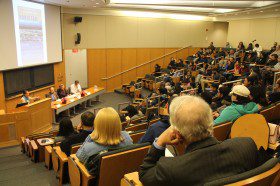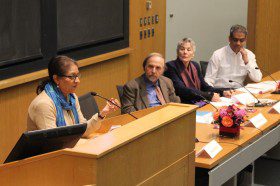By Mehjabeen Zameer, M.Ed Candidate in International Education Policy, Harvard Graduate School of Education; SAI Student Coordinator
On Wednesday, March 4, renowned Pakistani human rights activist Asma Jahangir, spoke about the state of Pakistan moving from one crisis to another at the Harvard Asia Center’s Tsai Lecture in a talk titled ‘Pakistan: From Crisis to Crisis.’
She highlighted efforts that needed to be taken to bring Pakistan out of this series of crises: redefining the foreign policy enabling the state to become a part of the international community, marginalizing the military establishment and strengthening the legal system of the state.
The event was moderated by Professor Arthur Kleinman, Director of the Harvard University Asia Center with Professor Asad Ahmed from the Department of Anthropology and Professor Jennifer Leaning from the Harvard School of Public Health participating as discussants.
Ms. Jahangir started off her talk by briefly touching upon the reasons that had led to Pakistan moving from one crisis to another, with the primary concern being the lack of consensus about the basic political direction the country must take. There exists confusion in the country about whether it is an Islamic state or not.
Ms. Jahangir made the case that if all that united the people in Pakistan was religion, then the state would have been able to retain East Pakistan, not marginalized Balochistan, or would have had better relations with other Muslim countries. Moreover, the strategic position of the country in the world had made the country a target of negative interventions. Strong leadership was needed by Pakistan to define the nature of the state and negotiate with the world with dignity and equality.
After this brief overview of Pakistan’s crisis situation, Ms. Jahangir presented her perspective on whether the country had the chance to get better. She made the case that based on the dysfunctional way the state had been functioning, things should have been much worse. All credit for this went to the committed civil society in Pakistan, which, even though less vibrant than it had been in the past, still had a presence.
 Ms. Jahangir commended the civil society for making itself economically viable through help from each other, despite no help from the state. She urged the civil society today to further rejuvenate itself and regain the spirit of the past by throwing off the “iron cap” of religion and nationality being forced on it by the state. Furthermore, she stressed the need for increasing tolerance of diversity and breaking the mindset of thinking that diversity of any form threatened survival.
Ms. Jahangir commended the civil society for making itself economically viable through help from each other, despite no help from the state. She urged the civil society today to further rejuvenate itself and regain the spirit of the past by throwing off the “iron cap” of religion and nationality being forced on it by the state. Furthermore, she stressed the need for increasing tolerance of diversity and breaking the mindset of thinking that diversity of any form threatened survival.
Speaking about the human rights situation in Pakistan, Miss Jahangir said that the situation had gotten better, but new challenges had emerged. Hundreds of young men had been picked up by the security forces in Balochistan, with some having been returned after being brutally tortured. She mentioned the indoctrination of state institutions against the Baloch as they had been against East Pakistanis in the past.Moreover, she stated that the state had forgotten that arbitrary detention, which thousands had undergone in Swat, was against the law.
She went on to highlight the injustices against women, in the form of honor killings, by asking the audience to think about what the media was not telling people. However, Ms. Jahangir stated that in some cases the judiciary had made oppression less painful. In the case of the blasphemy law, the parliament had approved it, but the judiciary stepped in and hence, more people had not been convicted.
Overall, the lecture presented Asma Jahangir’s argument that in Pakistan, there was a state within a state. She stressed the need for greater clarity about the nature of the Pakistani state. The lecture was followed by comments by Professor Asad Ahmed on the need for a pluralistic analyses of crisis, and by Professor Jennifer Leaning on the threadbare state of Pakistan after the partition in 1947.

